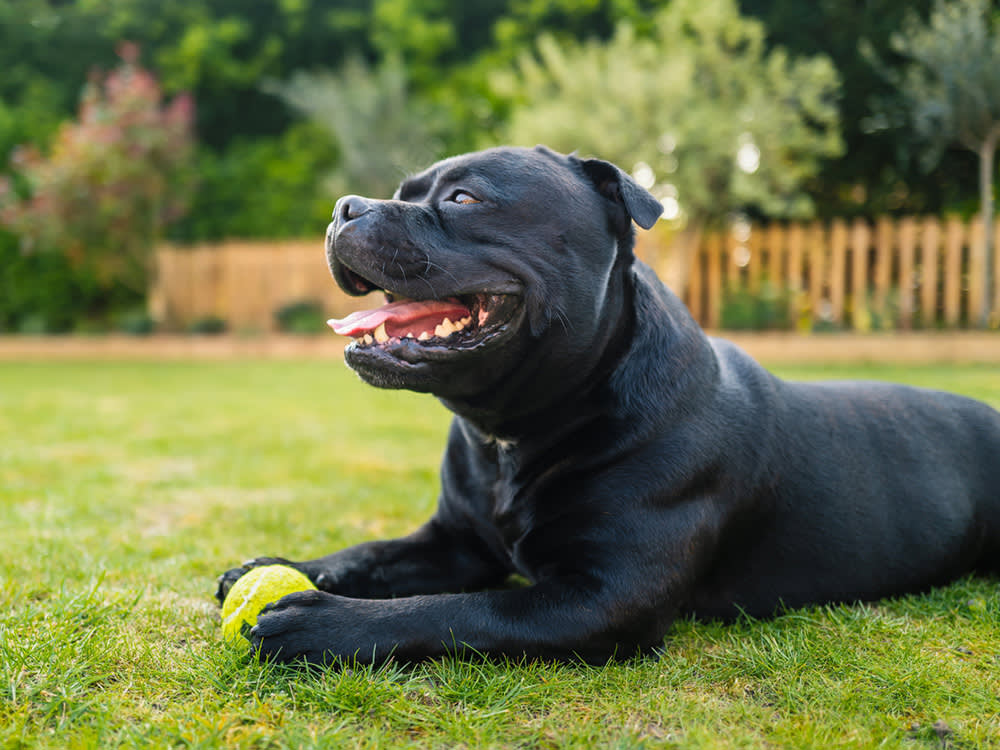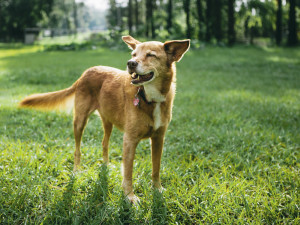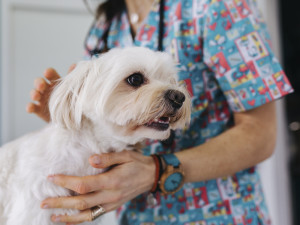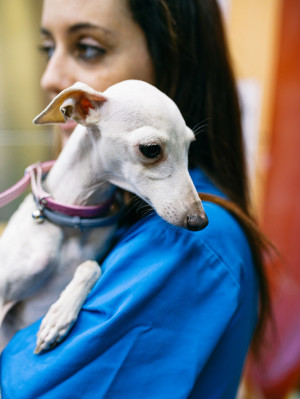Why Is My Dog Breathing Heavy?
Don’t panic, but definitely talk to your vet if you’re worried about any of these conditions.

share article
Heavy breathing in dogs can be normal, but it is important to be aware of the signs that it could indicate a medical problem. If your dog is breathing heavily at rest or in situations where they would normally be calm, please take them to the vet.
What are the symptoms of heavy breathing in dogs?
Dogs can show changes in their breathing in a variety of ways. Some common things that can indicate breathing issues include:
Open-mouth breathing
Increased noise when breathing
Restlessness or inability to lay down comfortably
Abnormally deep or shallow breaths
Rapid breaths
Persistent panting
Pale or bluish gums
Nasal discharge
Coughingopens in a new tab or sneezing
Gasping for air (fish-mouth breathing)
Other symptoms seen with respiratory issues may include lethargyopens in a new tab, hiding, loss of appetite, or fever, but these are non-specific and could be associated with a number of other conditions. Because so many respiratory issues are dangerous and can progress rapidly, it’s always best to get your dog evaluated by a veterinarian if you have any concerns that they are breathing abnormally.
What are the causes of heavy breathing in dogs?
A variety of issues can make a dog breathe differently than normal. The problem is that some of the causes of fast breathing in dogs are benign and will resolve on their own while others are major emergencies that require veterinary care. Being familiar with some of the common causes of heavy breathing is the first step to knowing what could be going on with your dog.
Exertion
Dogs that have recently had a bout of excitement or increased activity are expected to breathe faster and harder than they would at rest. Heavy breathing from exertion should return to normal after a short rest.
Heat/humidity
Dogs dissipate excess heat primarily through their respiratory system. Panting uses evaporative cooling across the tongue and airways to cool dogs down as quickly as possible. The efficiency of this cooling is decreased in high-humidity conditions, so precautions need to be taken to limit your dog’s activity when it is hot and/or humid.
Heart issues
Heart issues can cause breathing difficulty in a number of different ways. Congestive heart failureopens in a new tab can cause fluid to leak into a dog’s lungs, resulting in a decreased ability to absorb oxygen and increased effort required to fill the lungs with air. Heart failure (and a few other conditions) can also result in fluid accumulation in the chest or abdominal cavities. This build-up of fluid makes it difficult to expand the lungs effectively.
Lung disease
From pneumonia to canceropens in a new tab, problems within the lungs can impair a dog’s ability to breathe normally. Many lung issues will cause coughing and a change in a dog’s respiratory pattern. Even otherwise healthy dogs may have hidden lung abnormalitiesopens in a new tab that result in a sudden onset of difficulty breathing due to air leaking into the chest cavity.
Pain/trauma
Trauma to a dog’s chest can result in broken ribs, air leakage from the lungs, bleeding in the chest, or soreness that makes it difficult for them to breathe. While a known injury to the chest is an obvious cause of heavy breathing, it may be less obvious to dog parents that pain anywhere can cause a dog to breathe differently. Dogs will often pant when in pain, but some may take deliberate, shallow breaths to avoid moving the painful area.
Airway obstruction
Some causes of airway obstruction are immediately evident, as seen with a dog that unsuccessfully tries to swallow a toyopens in a new tab. Others are more nefarious, like the chronic airway issues that plague flat-faced dogs like French and English Bulldogs. Laryngeal paralysisopens in a new tab, seen most commonly in large breed dogs like Labrador Retrievers, results in a partial obstruction of the trachea by the vocal cords. Its symptoms worsen with panting and often become an issue in the warmer months. In areas that have venomous snakes, curious dogs can sometimes receive a bite to the tongue that causes massive swelling, requiring emergency procedures to secure their airway.
Anxiety
Panting while at rest is a common sign of anxiety in dogs. It can be challenging to figure out what is triggering anxietyopens in a new tab for some dogs, but getting them back into a familiar, comfortable situation should help resolve the issue.
Anemia
Dogs can develop anemia (a low red blood cell count) for a number of reasons. Red blood cells carry oxygen in the bloodstream, so dogs feel oxygen-starved when there aren’t enough cells to supply all their tissues. This triggers the body to increase the dog’s respiratory rate in an effort to get more oxygen into the bloodstream. Dogs with anemia often display a pale color to their gums and tongue.
Toxins
Certain toxins like acetaminophen and carbon monoxide affect the ability of red blood cells to bind to oxygen normally, reducing oxygen delivery to tissues and inducing rapid breathing. Gum color can vary from chocolate to cherry red to normal depending on the toxin.
Steroids
Corticosteroids can make dogs pant, even at rest. Steroid-induced panting can be seen from administration of medications like prednisone or from overproduction of natural steroids by the body in conditions like Cushing’s disease. Be sure to mention any medications or medical conditions your dog has to your veterinarian if you’re concerned about heavy breathing.
How do I determine whether my dog’s breathing is abnormal?
Differentiating expected alterations and abnormal changes in a dog's breathing can sometimes be a challenge. If you’re ever in doubt about your dog’s breathing, it’s best to have them seen by a veterinarian. It’s better to get some reassurance that things are fine than to miss out on catching a problem early.
Many pet parents worry about their dog hyperventilating after activity outside, especially during the summer months or on the first warm day of the year. Panting is a normal and expected response to activity in increased heat, but it can also indicate a problem if it is persistent. After activity, make sure your dog’s panting is resolving quickly once they’re calm and in a cool area. Rapid or noisy panting that is persistent should always cause concern.
A common sign of respiratory distress in dogs is restlessness. Many dogs having difficulty breathing will not be able to settle down comfortably and will pace the room while breathing harder or more rapidly than normal. Once a dog is resting, their respiratory rateopens in a new tab should be less than 30 breaths per minuteopens in a new tab. It’s often easiest to count the number of times they breathe in 30 seconds and multiply by two to get their respiratory rate.
When to be concerned about your dog’s heavy breathing
It's not an emergency every time your dog breathes a little hard, but you should watch out for some common red flags before deciding things are OK. Some things to check for when your dog displays heavy breathing include:
Gums or tongue that are any color but bubble gum pink, especially a pale or bluish color (this may be hard to see on dogs with pigmented gums)
Persistent panting or rapid breathing without an obvious cause
Abnormal breathing accompanied by coughing opens in a new tab
Fluid coming from the nose or mouth
Heavy breathing at rest with no recent activity
Any signs of distress (panicked look, restlessness, attention-seeking, hiding)
Swelling in or around the mouth, throat, or face
Any signs of pain
Increased noiseopens in a new tab when breathing
Weakness
It’s impossible to list every subtle sign that may call for a high level of concern when fast breathing in a dog has been noted. You know your dog better than anyone, so you should get them checked out if you feel something is off. Taking video of abnormal breathing or behavior can help your vet to diagnose the problem, because some dogs will hide their symptoms during the excitement of a car ride and vet visit.
How do vets diagnose breathing problems in dogs?
The first step in diagnosing breathing problems in a dog is observing their respiratory pattern. Veterinarians can often determine the general area of the problem (upper airway, lungs, chest cavity, or other) just by watching the pattern of a dog’s breathing. Careful auscultation (listening with a stethoscope) can also help localize the problem, and the type of sounds heard may give clues about the cause.
After the physical examination, imaging may be recommended. Chest radiographs (X-rays) have been the mainstay of diagnosis for years. They can give your veterinarian a good idea of what is going on in the chest cavity and within the lungs. Ultrasound of the chest is often performed in emergency situations. While it may not give all the information that a chest radiograph does, it is a much less stressful test for dogs that are in severe distress.
Complementary tests like pulse oximetry, blood gas analysis, a complete blood count, and blood chemistry can give a more complete picture of what could be causing a dog’s heavy breathing. If the initial imaging isn’t definitive in diagnosing or showing the extent of the problem, advanced procedures like an MRI or bronchoscopy may be recommended as long as the dog is stable enough for it.
How do you treat heavy breathing in dogs?
The treatment of fast breathing in a dog will depend on the cause. If a dog with heavy breathing is in any distress, getting them additional oxygen is key. This can be provided by a number of methods, including holding an oxygen line up to their face, putting them in a cage that contains a higher concentration of oxygen, or placing a small tube into their nose to deliver oxygen to the back of their throat.
Many veterinarians will administer a mild sedative to reduce a dog’s stress and anxiety while they’re being treated. This can also help by reducing their body’s oxygen demand. Calm dogs need less oxygen because they have less overall muscle activity.
Heart conditions often require medications like diuretics and drugs that strengthen heart contractions to help dogs breathe more easily. Other respiratory issues may be treated with antibiotics, cough suppressants, steroids, pain control, anti-anxiety medications, or surgery. Getting to the bottom of what is causing the abnormal breathing is vital to initiating appropriate treatment.
Can you prevent heavy breathing in dogs?
Some causes of heavy breathing can be prevented by informed and proactive pet parents. Other causes cannot be prevented but may be delayed by regular veterinary care that finds and addresses possible issues before they develop into major problems. Some general tips to prevent episodes of heavy breathing include:
Avoid exercising your dog in extreme heat or humidity
Ramp up activity gradually – don't try to make your dog go from a couch potato to an athlete in one day
Make sure your dog is at a healthy weight
Manage any underlying medical conditions that your dog may have
Do not administer any human medications to your dog and keep them away from toxins
Keep up-to-date on preventative care
Have your dog checked regularly by your veterinarian for any health concerns.
FAQs (People also ask):
Can hot weather cause heavy breathing in dogs?
Hot weather can cause heavy breathing in dogs as they try to dissipate extra heat by panting. If you feel your dog is breathing heavier than usual, make sure to get them into a cool, dry area and calm them down quickly.
Can heavy breathing be a sign of pain in dogs?
Pain can cause heavy breathing in dogs. Trauma to the chest or airway can obviously cause breathing issues, but pain anywhere in the body can cause a dog to pant and act abnormally.
References:

Dr. Bartley Harrison, DVM
Dr. Bartley Harrison, DVM is a small animal veterinarian based in North Carolina who has practiced emergency medicine since graduating from the Texas A&M College of Veterinary Medicine. His primary interest areas include pain management, cardiology, and the treatment of shock.
He is a member of the Veterinary Emergency and Critical Care Society, American Veterinary Medical Association, and American Medical Writers Association. In addition to his clinical work, he writes pet health articles to help provide accurate information for both new and experienced pet parents. When he’s not working, he enjoys cooking, traveling, reading, and going on adventures with his dog.
Related articles
![French bulldog puppy looking scared at vet]() opens in a new tab
opens in a new tab10 Things to Ask at Your First Vet Visit
There are no stupid questions — well, when it comes to your dog’s health.
![A happy woman is lying on a bed, her dog smelling her face.]() opens in a new tab
opens in a new tab9 Diseases You Can (and Definitely Can’t) Catch From Your Dog
Here’s what you can scratch off your “Worry About This” list.
![Man Kissing And Hugging a small white and brown dog.]() opens in a new tab
opens in a new tabA Mysterious Illness Is Making Dogs Across the Country Sick
Get all the info about this highly contagious respiratory illness—including its possible origins.
![Young woman carrying cute Italian Greyhound while working in modern veterinarian clinic.]() opens in a new tab
opens in a new tabA Mysterious Illness Is Making Dogs Across the Country Sick
Here’s what we know — and how to protect your pup.
![Australian shepherd panting with tongue out, walking ahead of owners.]() opens in a new tab
opens in a new tabHow to Keep Your Pets Safe During Extreme Heat Waves
As scorching summer temperatures become the new normal, here’s how to help keep your pets cool and healthy.










